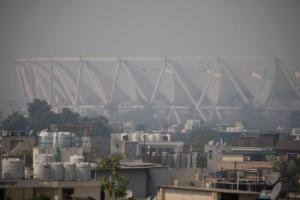The researchers used epidemiological data from the previous US and Chinese studies of air pollution and COVID-19 and the SARS outbreak in 2003, supported by additional data from Italy

A general view shows the Jawaharlal Nehru Stadium under heavy smog conditions in New Delhi. Pic/AFP
In a major global study, researchers have revealed that long-term exposure to air pollution may be linked to 15 per cent of COVID-19 deaths worldwide.
ADVERTISEMENT
According to the study, published in the journal Cardiovascular Research, in Europe the proportion was about 19 per cent, in North America it was 17 per cent, and in East Asia about 27 per cent.
"Since the numbers of deaths from COVID-19 are increasing all the time, it's not possible to give exact or final numbers of COVID-19 deaths per country that can be attributed to air pollution," said study author Jos Lelieveld from Max Planck Institute in Germany.
"However, as an example, in the UK there have been over 44,000 coronavirus deaths and we estimate that the fraction attributable to air pollution is 14 per cent, meaning that more than 6,100 deaths could be attributed to air pollution," Lelieveld added.
The researchers used epidemiological data from the previous US and Chinese studies of air pollution and COVID-19 and the SARS outbreak in 2003, supported by additional data from Italy.
They combined this with satellite data showing global exposure to polluting fine particles known as 'particulate matter' that is less than or equal to 2.5 microns in diameter (known as PM2.5) to create a model to calculate the fraction of coronavirus deaths that could be attributable to long-term exposure to PM2.5.
The results are based on epidemiological data collected up the third week in June 2020 and the researchers said that a comprehensive evaluation will need to follow after the pandemic has subsided.
Estimates for individual countries show, for example, that air pollution contributed to 29 per cent of coronavirus deaths in the Czech Republic, 27 per cent in China, 26 per cent in Germany, 22 per cent in Switzerland, 21 per cent in Belgium, 19 per cent in The Netherlands, 15 per cent in Italy and 14 per cent in the UK.
Referring to previous work that suggests that the fine particulates in air pollution may prolong the atmospheric lifetime of infectious viruses and help them to infect more people. Lelieveld said: "It's likely that particulate matter plays a role in 'super-spreading events' by favouring transmission."
According to the researchers, the particulate matter seems to increase the activity of a receptor on cell surfaces, called ACE-2, that is known to be involved in the way COVID-19 infects cells.
"So, we have a 'double hit': air pollution damages the lungs and increases the activity of ACE-2, which in turn leads to enhanced uptake of the virus by the lungs and probably by the blood vessels and the heart," the authors wrote.
Keep scrolling to read more news
Catch up on all the latest Crime, National, International and Hatke news here. Also download the new mid-day Android and iOS apps to get latest updates.
Mid-Day is now on Telegram. Click here to join our channel (@middayinfomedialtd) and stay updated with the latest news
This story has been sourced from a third party syndicated feed, agencies. Mid-day accepts no responsibility or liability for its dependability, trustworthiness, reliability and data of the text. Mid-day management/mid-day.com reserves the sole right to alter, delete or remove (without notice) the content in its absolute discretion for any reason whatsoever
 Subscribe today by clicking the link and stay updated with the latest news!" Click here!
Subscribe today by clicking the link and stay updated with the latest news!" Click here!






